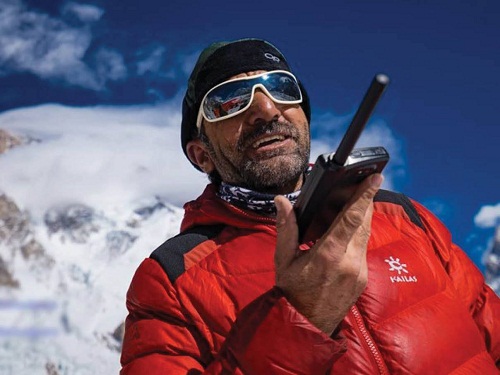ISLAMABAD: Families of three missing climbers from Iceland, Chile, and Pakistan Wednesday vowed to carry on with a rescue mission despite a halt due to bad weather, with the help of sophisticated satellite data, to search every inch of the “savage mountain – K2.”
“For the first time ever, this team is working with the Iceland Space Agency to review SAR technology not SAT technology -never before used in search and rescue – to cover every inch of the higher elevations of this mountain despite the bad conditions,” a statement said.
The families and friends have set up a virtual base camp to ensure a thorough search-and-rescue effort. The camp has been established by Rao Ahmad, Ali Sadpara’s long-time friend and Sajid Sadpara, Ali Sadpara’s son, along with British-American climber, Vanessa O’Brien, who also serves as Pakistan’s Goodwill Ambassador and summited K2 with John Snorri, a statement issued from Skardu said. The team has got the support of the ICEYE – a global leader in small satellite synthetic-aperture radar (SAR) technology that produces high-resolution imagery; collected through even clouds and darkness, according to information available on its website.
“ICEYE’s slogan, “every square meter, every hour” gives us the perfect visual acuity to view areas inaccessible to helicopters because of harsh winter conditions and excessive winds,” the statement said.
According to Home Secretary Muhammad Ali Randhawa, FLIR (Forward Looking Infrared Radar) mission with a C-130 aircraft, to find the missing climbers through thermal imaging, will start Thursday morning, while ground teams would also follow the path taken by the mountaineers.
Earlier bad weather at K2 on Wednesday, hampered helicopter search and rescue operation.
“We are extremely grateful to Daniel Leeb, the Founding Partner & Mission Director at the Iceland Space Agency, for his incredible leadership and assistance, as well as the extraordinary teams at Airbus, Planet, and EGEOS,” the statement said.
The virtual team of family and friends asked the anxious people to understand that a lot of work was going on in the background tracing department and not to worry if helicopters can fly or not fly.
“If the weather is good, yes they will fly, but multiple flights have not seen any bodies. We are using more sophisticated technology. Please avoid those rumours that talk rubbish.”
The team has also got additional data from devices the climbers carried – Garmin, Thuraya, Inmarsat — together with interviews from witnesses, to create a time frame of the climbers’ locations during their summit bid.
“We are grateful for the helicopter flights by the Pakistan Army pilots, who pushed the upper limits during each of these search flights.”
The team also thanked the Canadian filmmaker Elia Saikaly for capturing imagery during these search-and-rescue flights, and to (Ret) Lt Col. Hassan bin Aftab, Director of Operations at Pakistan Analytica, who coordinated overall logistics for the search-and-rescue attempts and served as the point person for our families.
None of this would have been possible without the support and assistance of the Chief of General Staff and the Pakistan Army. We are very grateful to ISPR, the Chief of Defence of Iceland, and the Foreign Ministers of Iceland, Pakistan, and Chile.
“We would like to thank everyone who expressed interest in John, Ali, and JP’s climb, and to those who expressed concern for their wellbeing, those who offered to help, and those who prayed for their safety and offered ideas and thoughts on the use of drones and search locations.”
Freezing temperatures and wind chill, averaging -50 degrees Celsius, and strong winds have made the flight operations next to impossible.
However the team believes that the climbers could have built an ice cave or shelter, and if they had sufficient fuel to melt water, it could have extended their lifeline, “but it depends how low they made it down on the mountain.”
The families have requested the government of Pakistan to continue to provide search and rescue support, weather permitting with a quote of Martin Luther King Jr – “We must accept finite disappointment, but never lose infinite hope.”
In a few day old tweet by Sajid Ali Sadpara, son of the missing climber Ali Sadpar, he shared a video clip of an army rescue team trying to locate the missing climbers lost at an altitude of around 8000 meters, in -50C temperature and winds with gusts of over 90 km, glimpse into the harsh conditions.
Ali Sadpara had the honor of hoisting the flag of Pakistan on eight 8000 meter peaks and was aiming for 14.
According to the magazine, “Climbing” K2 is considered to be the most formidable peak on Earth. Just 200-meters shorter than Mount Everest, but far more technical and far more deadly, K2 has been summited a total of 355 times, and 82 people have lost lives attempting K2 – roughly one death for every four successful climbers.
Only 14 mountains rise above 8,000 meters, and all of them have been climbed in winter except for K2.
“Summiting K2 in winter is arguably the greatest unclaimed prize in mountaineering. Year after year the mountain beckons bold alpinists, and year after year their attempts are thwarted by the unfathomable conditions coupled with the unavoidable challenge of the climbing.”

















